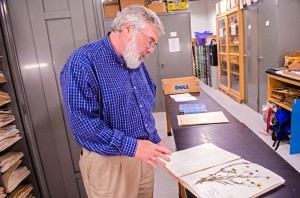Appalachian State University biology professor Zack Murrell is heading a multi-state project to create a digitized database of roughly 15 million plant specimens from across the Southeast.
Murrell started the project, which recently received a $2.545 million grant from the National Science Foundation.
The project, titled “The Key to the Cabinets: Building and Sustaining a Research Database for a Global Biodiversity Hotspot,” will allow citizen scientists across the nation and the world to study specimens that before could only be observed in museums.
“Ultimately, the exciting part about this is taking the information that’s in these cabinets and making it available for modelers to do all sorts of things from,” Murrell said.
The modelers are scientists who would use the plants to study biogeographic issues.
“The data [we’re] assembling can be used by researchers to study the effects of climate change, identify and prioritize

important areas for conservation efforts and investigate the impact of habitat loss,” said Joseph McKenna, a biology graduate student involved in the project.
The southeast is unique because it is one of the most biologically diverse regions in North America, containing 233 herbaria, or collections of plants, and over 15 million plant specimens.
Murrell said the most exciting aspect of the project is the way that it will unite the scientific community. By taking numerous physical collections and moving them online where anybody can study them creates an online community for scientists interested in natural history.
“We already have a virtual community of experts,” Murrell said. “We want to connect that community with a broader community of amateur scientists that want to take part [and] make them full partners. Our hypothesis here is that we sustain our community effort by helping people understand they’re fully involved in this virtual community.”
Murrell said he acknowledges that society has become much more global since the arrival of the Internet, and feels like this database will be a major step for the scientific community in joining the globalization.
McKenna said the most positive impact of the database will be to make information about regional flora available to both researchers as well as the general public.
The creation of this database is many years in the making for Murrell, and is the culmination of years of dedication and hard work. The roots of the project began seven years ago, when he founded the Southeast Regional Network of Expertise and Collections, or SERNEC, with a $500,000 grant from the National Science Foundation.
Now, SERNEC is partnered with five other organizations on this project – Symbiota, an Arizona-based group; GEOlocate, from Tulane; Notes From Nature, a group-based out of the University of Florida; the Adler Museum in Chicago; and the Texas Advanced Computing Center.
The most recent grant of $2.545 million will be split between Appalachian and the other entities involved in compiling the specimens.
Approximately $1.545 million will go to the five programs for collecting and compiling the specimens. The remaining $1 million will be given to Appalachian for hiring a project manager, student workers, software developers and purchasing the required technology.
Story: Thomas Culkin, Intern News Reporter
Photo: Morgan Cook, Photo Editor
